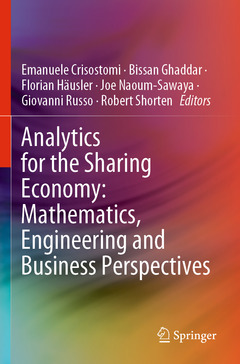Description
Analytics for the Sharing Economy: Mathematics, Engineering and Business Perspectives, 1st ed. 2020
Coordinators: Crisostomi Emanuele, Ghaddar Bissan, Häusler Florian, Naoum-Sawaya Joe, Russo Giovanni, Shorten Robert
Language: English
Subject for Analytics for the Sharing Economy: Mathematics...:
Publication date: 03-2021
Support: Print on demand
Publication date: 03-2020
348 p. · 15.5x23.5 cm · Hardback
Description
/li>Contents
/li>Biography
/li>Comment
/li>
The book provides an encompassing overview of all aspects relating to the sharing economy paradigm in different fields of study, and shows the ongoing research efforts in filling previously identified gaps in understanding in this area. Control and optimization analytics for the sharing economy explores bespoke analytics, tools, and business models that can be used to help design collaborative consumption services (the shared economy). It provides case studies of collaborative consumption in the areas of energy and mobility.
The contributors review successful examples of sharing systems, and explore the theory for designing effective and stable shared-economy models. They discuss recent innovations in and uses of shared economy models in niche areas, such as energy and mobility. Readers learn the scientific challenging issues associated with the realization of a sharing economy. Conceptual and practical matters are examined, and the state-of-the-art tools and techniquesto address such applications are explained. The contributors also show readers how topical problems in engineering, such as energy consumption in power grids, or bike sharing in transportation networks, can be formulated and solved from a general collaborative consumption perspective.
Since the book takes a mathematical perspective to the topic, researchers in business, computer science, optimization and control find it useful. Practitioners also use the book as a point of reference, as it explores and investigates the analytics behind economy sharing.
Introduction.- Optimisation.- Networking.- Game Theory.- Queuing Theory.- IoT and Cloud Computing.- Blockchain .- New Business Models.
Emanuele Crisostomi received the Bachelor’s degree in computer science engineering, the Master’s degree in automatic control, and the Ph.D. degree in automatics, robotics, and bioengineering, from the University of Pisa, Italy, in 2002, 2005, and 2009, respectively. He is currently an Associate Professor of Electrotechnics with the Department of Energy, Systems, Territory and Constructions Engineering, University of Pisa. His research interests include control and optimization of large-scale systems, with applications to smart grids and green mobility networks. He is a co-author of the recently published book: “Electric and Plug-in Hybrid Vehicle Networks: Optimization and Control” (Crisostomi, Shorten, Stüdli, Wirth), CRC Press, Series: Automation and Control Engineering, 2017. He is currently an Associate Editor for IEEE Access and for Frontiers in Sustainable Cities.
Bissan Ghaddar is an Assistant Professor of Management Science at the Ivey Business School workingon problems at the intersection of smart cities, machine learning, and optimization models. Prior to joining Ivey Business School, she was as an Assistant Professor in Data analytics at the Department of Management Sciences at the University of Waterloo. In addition to her academic experience, Prof. Ghaddar has extensive industrial experience. She was a research scientist at IBM Research where she worked on optimization problems for smart cities, mainly in the area of energy, water, and transportation networks and she also worked at the Department of National Defence Canada on developing new models and solution approaches for the integrated repair network planning and spare parts inventory management problems. She was invited for extended research visits at the Universität zu Köln in Germany and the University of Avignon in France. Her work has been published in prestigious journals such as Mathematical Programming, SIAM Journal on Optimization, Transportation Research, among others. Her




